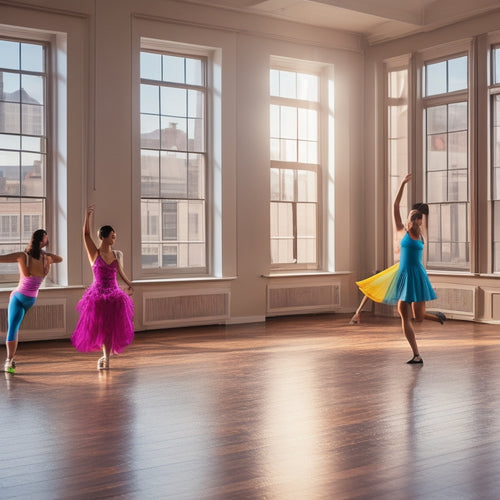
Dance Studio Guidelines: Etiquette, Attendance, and More
Share
Establishing a well-structured and respectful dance studio environment is essential for fostering artistic growth, promoting self-discipline, and encouraging accountability among students. A conducive learning environment can be achieved by adhering to essential guidelines, promoting respect, and encouraging a sense of responsibility. Attendance and accountability are also important, as they demonstrate a commitment to artistic development and improve technical skills. Additionally, studio policies and reminders, such as labeling dancewear and belongings, help maintain a safe and respectful environment. By following these guidelines, dance studios can create an ideal setting for students to thrive; discover the specifics of each aspect to create a harmonious and productive dance community.
Key Takeaways
• Respect the dance room by adhering to essential guidelines and maintaining a conducive learning environment.
• Maintain a positive atmosphere by avoiding distractions, unsportsmanlike conduct, and inappropriate behavior.
• Demonstrate commitment to artistic development through regular attendance, punctuality, and taking responsibility for learning missed steps.
• Adhere to studio policies and guidelines to ensure a safe, respectful, and professional environment.
• Foster a productive dance community by establishing clear expectations, promoting a positive experience, and developing a strong work ethic.
Respect in the Dance Room
Respect in the Dance Room is rooted in adhering to essential guidelines that foster a conducive learning environment, ensuring a positive and productive experience for all students. By establishing clear expectations, we promote self-discipline and accountability among students, allowing them to focus on their artistic growth.
A positive environment is nurtured when students refrain from using cell phones, eating, or engaging in unsportsmanlike conduct during class. Additionally, keeping hands off the mirrors and avoiding profanity maintain a respectful atmosphere.
Attendance and Accountability
Regular attendance and punctuality are essential components of a student's success, as they demonstrate a commitment to their artistic development and foster a sense of responsibility that extends beyond the dance studio. By attending classes regularly, students not only improve their technical skills but also develop a strong work ethic and discipline.
| Attendance Expectations | Responsibility |
|---|---|
| Attend classes regularly | Demonstrate commitment to artistic development |
| Notify teacher of absences | Take responsibility for learning missed steps |
| Arrive on time | Develop a sense of punctuality |
| Communicate with teacher | Foster open communication and accountability |
Studio Policies and Reminders
Throughout the dance studio, guaranteeing adherence to established guidelines and policies is essential for maintaining a productive, safe, and respectful environment for all students and instructors.
To make sure a smooth operation, we have implemented certain policies and reminders. To prevent lost items, we encourage students to label their dancewear and personal belongings. Efforts will be made to locate and return lost items, but the studio is not responsible for lost items.
Additionally, we expect students and parents to exercise professionalism on social media, avoiding negative comments about the studio or events, and refraining from posting choreography in its entirety.
Frequently Asked Questions
Can I Bring a Friend to Observe a Class?
"A million curious minds want to know: can you bring a friend to observe a class? Unfortunately, our Guest Policy dictates that visitors are not allowed in the dance room during class, as it may cause Class Disruptions and compromise our Visitor Etiquette, so we kindly decline, adhering to our Observation Rules, and instead encourage a Buddy System outside of class hours."
What if I Have a Scheduling Conflict With a Performance?
In the event of a scheduling conflict with a performance, prioritize communication with the teacher to discuss alternative arrangements, such as a makeup rehearsal, ensuring minimal disruption to the student's participation and overall performance experience.
How Do I Handle a Disagreement With a Teacher?
When handling a disagreement with a teacher, employ respectful confrontation and open communication by calmly expressing concerns, listening to their perspective, and seeking a mutually beneficial resolution, ensuring a constructive and respectful outcome.
Are There Any Opportunities for Private Lessons?
We offer private coaching sessions for personalized training, tailored to individual needs, providing one-on-one attention to refine technique, accelerate progress, and enhance overall performance, fostering a deeper connection between student and instructor.
Can I Switch to a Different Class or Level?
Class transfer and level upgrade requests are considered on a case-by-case basis; students must meet prerequisites and demonstrate proficiency in current level, with approval from the instructor and studio management prior to making a change.
Related Posts
-

7 Time-Saving Hacks for Makeup Artists' Self-Care
As a makeup artist, you know the importance of self-care, but finding time for it can be a challenge. You're not alon...
-

Top New Balance Dance Shoes for Comfort and Performance
If you're on the hunt for top New Balance dance shoes that maximize comfort and performance, consider models like the...
-

Ballet Cut File Set: Versatile Designs Available
The Ballet Cut File Set offers a wide-ranging collection of versatile designs available in multiple formats, includin...


